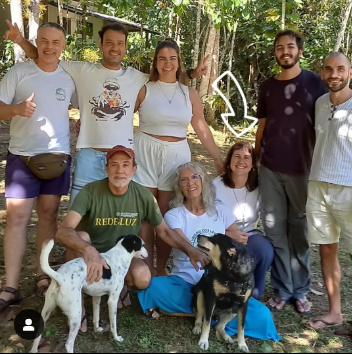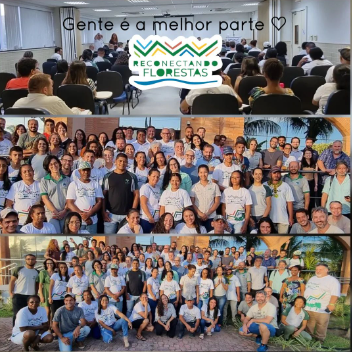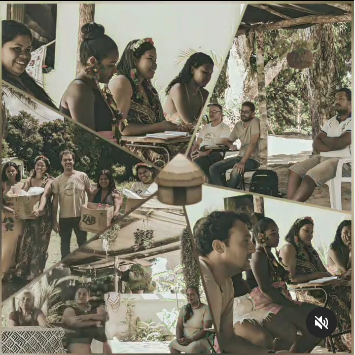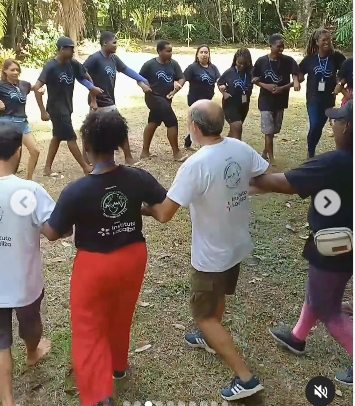The implementation of the Climate Guardian Tourist Destinations in Brazil is part of the future vision of the CO2 Legal Climate Guardians Tourism Program, one of the most innovative and creative initiatives in the world in the area of tourism, which in recent years has been recognized by prestigious awards, including the Sustainable Tourism Innovation Challenge Award, promoted by Ashoka Brazil; and gold winner of the WTM Latin America Responsible Tourism Awards, in the Travel and Tourism Decarbonization category.
The Climate Guardian Tourist Destinations proposes the creation of a broad system of shared value, engaging the most diverse social actors - tourism entrepreneurs, tourists, local residents, rural communities, traditional populations, public authorities and Civil Society Organizations - to act in a collaborative and integrated way in favor of the climate, the protection and regeneration of natural and sociocultural heritage. sustainable and regenerative agriculture and socioeconomic inclusion of social groups living in situations of vulnerability.
The implementation of the Climate Guardian Tourist Destinations will boost the progress of the 2030 Agenda in Brazil, focusing on 10 Sustainable Development Goals:
- Poverty eradication - combating poverty and socioeconomic development in rural areas;
- Zero hunger and sustainable agriculture - food sovereignty and promotion of agroecological agriculture;
- Health and Well-being for all;
- Clean water and sanitation in the beneficiaries' properties;
- Reduction of inequalities;
- Sustainable Cities and Communities;
- Responsible consumption;
- Climate action - Reducing emissions and fixing GHGs;
- Life on land - Conservation and restoration of forests and ecosystems, biodiversity and environmental assets;
- Partnership and Means for Implementation - structuring of partnerships and networking for the implementation of the program's actions.
The innovation of the Project lies in the creation of a Financial Mechanism, supported by the optional monetary collection of GHG emissions generated by tourism trade enterprises and tourists, which finances socio-environmental actions in tourist destinations. One of these actions is the Payment for Environmental Services to social groups living in vulnerable situations – family farmers, indigenous peoples and quilombolas. Upon receiving the Payment for Environmental Services, the beneficiaries assume the following socio-environmental commitments: Conserve the forest areas of your rural property;
- Restore degraded areas and make the environmental adjustment of the same;
- Adopt agroecology as a model of agricultural production;
- Interrupt the hunting of wild animals and the use of fire to clear gardens;
- Children should attend school and be protected from jobs that harm their health;
- Participate in training and technical advisory activities that take place once a week.
This socio-environmental commitments was defined bottom-up within different bioregional traditional communities all over Brazil.
In the current context in which the climate emergency plays a decisive role in the future of the planet, it is imperative and urgent to engage people and productive sectors in the climate agenda.
It is in this sense that the Implementation of Climate Guardian Tourist Destinations project has as its mission to engage and transform entrepreneurs in the tourism sector, tourists, local residents, and traditional populations – family farmers, indigenous peoples and quilombolas – into protagonists in facing the climate emergency and the sustainability of Brazilian tourist destinations.
The project is based on the following values: fraternity; collaboration; honesty; innovation; simplicity; ethics, transparency; responsibility; purpose; regeneration; and spirituality.
- Costa de Itacaré – Serra Grande Environmental Protection Area, on the southern coast of the state of Bahia;
- Caraíva – Trancoso Environmental Protection Area, on the extreme southern coast of the state of Bahia;
- Jijoca Lagoon Environmental Protection Area, in Jijoca de Jericoacoara, on the north coast of the state of Ceará.
In the social pillar, the project works on the socioeconomic and cultural regeneration of traditional populations – family farmers, quilombolas and indigenous people. To this end, the project offers these families Payment for Environmental Services, in the amount of R$ 400.00 per month, which works as an economic incentive for them to conserve and regenerate the forests, biodiversity and natural resources of their properties. The project also offers training and technical advice so that these social groups can be included in the tourism economy, both as suppliers of agroecological food and as offsets of greenhouse gas emissions from the tourist trade and tourists. Thus, these families are able to increase their income and, consequently, have an improvement in their quality of life. As a result, there is a regeneration and strengthening of the social fabric in rural areas, which contributes to the customs, values and cultural traditions of these social groups being rescued, regenerated and valued.
In the environmental pillar, the project contributes to the construction of a new model of rural development, based on the transition of properties, moving from an agricultural model with a high environmental impact, generated by the cutting and burning of the forest and the use of pesticides, to an agroecological model that promotes the regeneration and conservation of forests, soil, water resources and local biodiversity.
Among the regenerative actions carried out by the project, the following stand out: the conservation and restoration of forests and biodiversity; implementation of agroforestry systems; implementation of agroecological models on the beneficiaries' properties; implementation of ecological cesspools on the properties; and reduction and compensation of greenhouse gas emissions from the tourism production chain.









